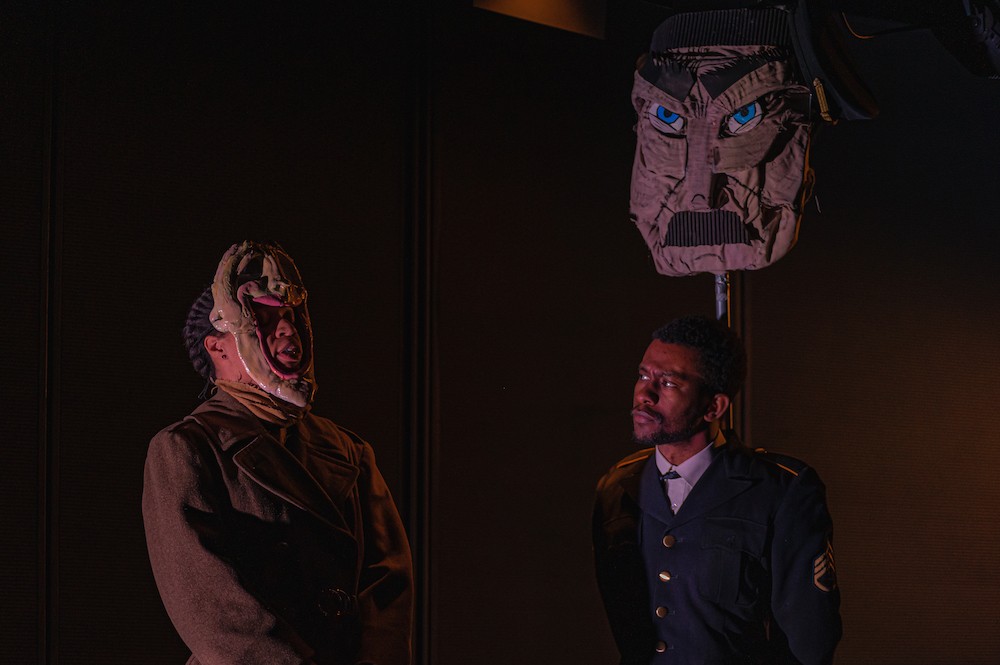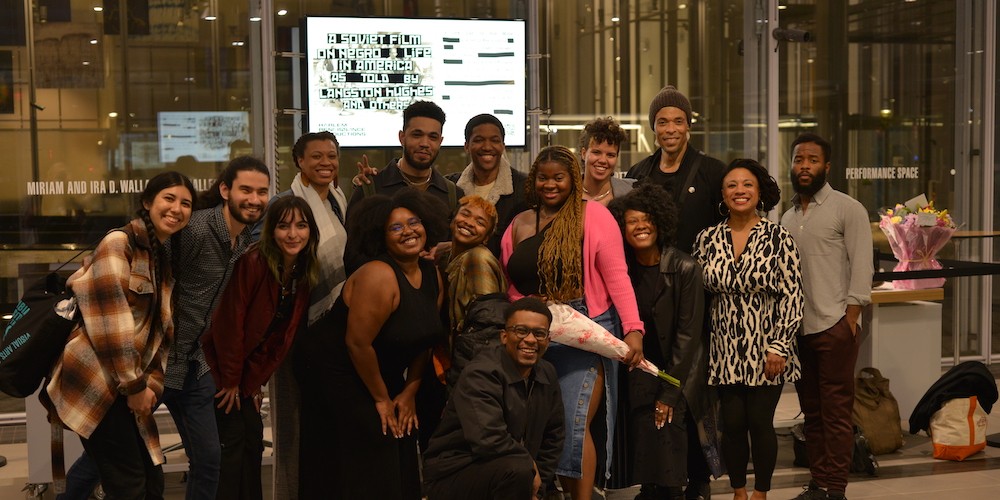School of the Arts Students Collaborate Across Concentrations for Thesis Play
It’s with an endearing familiarity and obvious mutual respect that Theatre alum Alle Mims '23 and Film alum Wes Goodrich '23 describe their collaboration on A Soviet Film on Negro Life in America as Told by Langston Hughes and Others—Mims's thesis play, which premiered at Columbia University School of the Arts's Lenfest Center for the Arts last spring. Mims, a Playwriting student at the time, tapped Film Directing student Goodrich to direct the play—kicking off a unique collaboration between programs and disciplines.
Mims and Goodrich met when they took the same TV Pilot Writing class with former Adjunct Professor Ming Peiffer '16 during the COVID-19 pandemic. At the time, the class was still on Zoom, and while Mims and Goodrich knew of each other, they hadn't yet discovered their shared artistic sensibilities. Later, the two met again in person and bonded in a class about minstrelsy. This class, taught by Associate Professor of Film and Media Studies, Racquel Gates, would later influence the route they took in developing Mims’ play.
“I remember that class was great because every week would be us examining how minstrelsy is a very pervasive thing in American pop culture,” Mims said. Their studies in that class had a big influence on Mims thesis play, which explores themes of race, identity, and politics.
A Soviet Film on Negro Life in America as Told by Langston Hughes and Others is a humorous, dramatic, and highly theatrical retelling of the real-life trip that Langston Hughes and a group of other Harlem Renaissance artists took to the Soviet Union in 1932. Their goal was to make a communist propaganda film, but the experiences of the artists on the trip proved to be more fraught than they had expected, particularly for Hughes, who had to balance his distinct identities as a communist and a Black American.
“I knew that I wanted to use minstrelsy and race performance in some way," said Mims. “Namely that I wanted to have an all-Black cast, but I knew there were going to be white characters." Mims conceived of the play as a period trunk-show about the performance of race, in which on-stage costume changes and stylized masks would be used to denote character changes and represent white characters. "I was desperately trying to think of a director who would understand my sensibilities and what I was trying to do with the characters and the tone; and when I saw [Goodrich] in that class, I thought, 'this might be perfect.' We can at least have this starting point where we both have some sort of understanding of how minstrelsy shows up in pop culture and media. I found that super useful because we found that a lot of tropes we were studying [in Gates's class] showed up in the history that we were looking into about this trip.”

The two began collaborating early on in the play’s process, with Goodrich providing feedback on Mims’ script while they developed it. “It was my first time working with a director this closely on such a long project,” Mims said. “We had a lot of time together. Wes would come in and say, ‘I've been doing research.’ I was blown away by how much he was willing to read and search and find. He really helped mold the characters in a way that I wasn't expecting.”
The two continued to shape the play throughout the rehearsal process, having in-depth conversations about the work up until the day the play opened. “Working together was a process of talking through ideas and figuring out what was not working, what was working, how to make the things that worked stronger,” Goodrich said. “That went all the way through our last rehearsal.”
Goodrich primarily works in film, but got his start as a director in theatre. “I had studied theatre directing in college in undergrad. Theatre was always a part of my discipline, even when I was in college,” Goodrich said. “I think even if you want to direct movies, theatre is a great place to start. In film school we only had one class that dealt with actors and text work which I think is vital for both film and theater. But I think in theater it's really vital, especially for someone who thinks about what’s playing scene to scene like Alle does.”

After the play's premiere in April 2023 as part of the School of the Arts's New Plays Festival, A Soviet Film on Negro Life in America as Told by Langston Hughes and Others was subsequently given an industry reading which Goodrich also directed. Post-graduation, the two are still collaborating, even if they’ve switched up the style a bit. “It’s a lot of texts,” Goodrich said. Mims laughed and added, “Lots of voice notes.”
"Voice notes are great," agreed Goodrich, "because it's like getting a podcast from Alle. It's like getting a little three minute podcast and I'm washing dishes while I listen.”
Goodrich is now slated to direct Mims’ first short film. “I remember they sent me the script at like 7 pm and by 9 pm I had read it,” Goodrich said, his excitement about the project evident.“I told them, ‘Let's meet tomorrow.’”
Mims is a playwright whose work has been performed at Imprint Theatreworks, Guinea Pig V, Sundown Art Collective, Camp Death Productions, and The Aviary. A voice and theatre actor in addition to being a playwright, Mims has a BA in Drama from Texas Woman's University. “My writing unearths buried histories and builds joyful fantasies populated with people like me,” says Mims about their work. “As a performer, I gravitate towards comedy, and will never turn down a good old fashioned Shakespearean genderbend.”
Goodrich was the winner of the 2023 ACE Entertainment Award for Best Film for his film Palm Sunday at CUFF, the Columbia University Film Festival. He is also the recipient of the Columbia University Dean’s Grant and The Katharina Otto-Bernstein Grant. Featured in Filmmaker Magazine’s 2023 New Faces of Independent Film, Goodrich’s films have screened at New Orleans Film Festival, Calgary International Film Festival, Cleveland Int’l Film Festival, American Black Film Festival, Brooklyn Film Festival, and Dances with Films LA.
